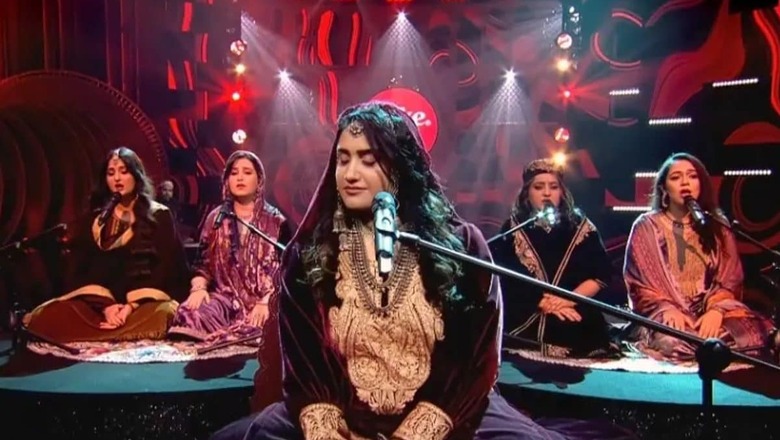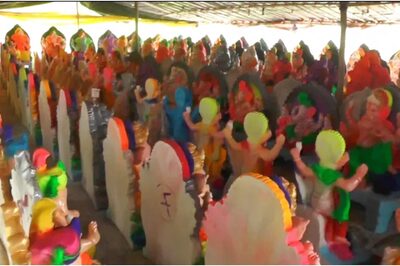
views
With the debut of Coke Studio Bharat & Coke Studio Tamil in India this year, Coke Studio, a music platform with diverse musical genres in numerous languages, continues to celebrate brilliant & up-and-coming musicians. Coke Studio Bharat is spearheading a creative season with an amalgamation of over 50 artists from all over the country who have come together to create over 10 unique tracks honouring the roots of Bharat after receiving an incredible response to the debut.
Their fifth song has just been released and Kya Karie Korimol is the name of the Kashmiri song. The Kashmiri song, which also displays Kashmir’s rich cultural past and weaves a message of love and caring into its lyrics, narrates the tale of a bride and her father as they prepare for the wedding feast. The song honours the new bride’s feelings as they are woven into the celebrations of a Kashmiri wedding, along with pride, tradition, Tehzeeb, and wazwaan, a special time when love, food, family, and friends are all present.It includes joint artwork created by Noor Mohammad, Aashima Mahajan, and the brilliant artist Mohammad Muneem, well known by his stage name Alif.
Exceprts from the interview:
I want to start by congratulating Kya Karie Korimol. Can you describe the factors that led to the creation of this song? Was it influenced by a father-daughter duo you have really seen in person?
Alif: Thank you! Grateful for the love it’s gotten. The story transcends everything when it is told in an honest and authentic way. Coke Studio has been a great platform in creating music and being an amazing storyteller that resonates with multiple audiences and communities. They have done great in the sub continent to document flavors of artists. When Coke Studio Bharat approached us, we wanted to share a story that all of us connected with. Amit Gadgil (bass), Aman Moroney (electric guitars, piano), Karan Chitra Deshmukh (drums and dabuka) Tanmay (Acoustic Guitar).
Aashima: Thank you so much and I think the vision of the song was mainly Alif’s. So, I think he can answer this question better.
Everyone in the nation, regardless of where they are from, but notably the Kashmiris, has shown their love for the song. How do you think your songs have helped Kashmiri music gain the respect it deserves? What are your views?
Alif: Like I said, the story transcends everything when it’s told in an honest way. Just grateful we get to be ourselves. And everything else is humbling.
Aashima: We are absolutely grateful that the emotion that we wanted to transcend in the audience has reached them in exactly the same way and in fact we have received immense love, which is overwhelming. But, the song was not made keeping in mind any language. It is a father – daughter relationship across the nation. Har jagah jab beti ki shaadi hoti hai tab pita ko kaise lagta hai, yeh common emotion hai jo pure bharat mein hai. Aise koi language ko maddenazar rakhe nahi kiya gaya tha. I am glad that so many people of Jammu and Kashmir are resonating to the song, celebrating and they are feeling powerful with the song. It just makes you happy when you are making someone feel powerful, feel strong, feel pride in their culture.
A post shared by Coke Studio Bharat (@cokestudiobharat)
3. You have eloquently portrayed the particular nature of a father-daughter relationship using the lyrics of a song. Are there any specific lines in this song that have a special importance for you and that you would want to share?
Alif: Dakiya Badal Gaya chithiyoun ko Kya pata. And if I share what it means to me the thrill of what it means to you will go. So different perspectives are required.
Aashima: So the few lines that I sing are the only lines in Hindi. So bahut sare logo ko samajh aata hai woh bhasha jo kashmiri nahi samjhte. Toh usmai meri ek favorite line hai aur bahut saare logo ne ispe baat bhi ki hai. *Aashima sings a line* Daakiya badal gaya chittiyon ko kya pata. This line hits differently. Every person who has left their home has resonated to this line. There are so many people I am on a US show trip with right now. So this is one of my favorite lines in the whole song.
4. Your songs’ folk sounds are their heart, and they have always spoken so beautifully about Kashmiri customs and cultures. Have you been successful in expressing what you wished to express through your lyrics, and how do you feel that you have brought Kashmiri music into the mainstream as a composer? What were the points that you made when crafting this lovely song?
Alif: I don’t believe we have a specific genre. The language we write in is Urdu Hindustani & Kashmiri. The sounds are different be it Alladin or Lalnawath or Katyu. Each song has a different sound of what it is. The song was initially released as a single in 2018 and in coke studio bharat we got to extend the story and experiment.
Aashima: I think this question is absolutely for Alif and I feel that he has brought Kashmiri music as a composer on radar. People are loving it. I have Tamilians and marathi people around me. He has been dancing to the song and playing around with the song. He is a musician himself, like the whole family are musicians and this two year old kid is enjoying Kya Karie Korimol. He loves the transition then it comes to the Wanvun. He listens to the song 5 times before he goes to his play school in the morning. You have been honest to your music and that is why it is reaching two year old kids also. So this is absolutely a great achievement I feel. So happy to be a part of this
A post shared by Coke Studio Bharat (@cokestudiobharat)
5. The popular trends can occasionally be used to characterize the Indian music industry. How valuable do different voices then become?
Alif: The way music is consumed all over the world has changed because of the internet. People are consuming all kinds of music across the world because there are so many different voices and it finds its way to people’s hearts and lives. Sometimes slow, sometimes quick. Many times anything new takes a little time for people to absorb. E.g we go to a restaurant we mostly order a dish that we have tasted before and hardly order something we haven’t tasted or which feels different. Similarly in music popular trends are the dishes that feel nice because people know how it tastes. Which is great even I do the same. However, unlike in restaurants and with dishes one can be a little braver and explore to listen to different artists and consume different art forms as it will only help us develop & find out what we connect with more or otherwise.
Aashima: India is a land of varied cultures, languages, traditions and different kinds of music and when it comes to becoming a voice for Indian music industry kya trend kar raha aajkal and you know itta range and itta diversity hai humare paas songs ka and kashmiri folk song becoming one of that trend is a very precious feeling and I feel this also worldwise when I see some people from North America, South africa enjoying Kya karie korimol and listening to the whole song in loop, it just makes me feel that that’s how we are representing our nation to the outside world. We have so many flavors of songs, this is one of our flavors and we are happy and ecstatic that its one of the trending songs right now and it’s becoming one of the voices of the world. The main theme of Coke Studio Bharat this time is #ApnaSunao and humne apna sunaya hai aur woh logo tak ache tarike se pahuch raha hai. So that’s the main thing I want to say, that it is reaching people in a very beautiful way.
6. Finally, who are your music idols and what is next in line for you?
Alif: There are so many amazing artists who have inspired me, can’t name just a few. Next in line is what has been happening all along, that is to stay inspired to keep doing what we do. And finding strength to be ourselves. With regards to releases we just put out a single Siyah | FItna Fitoor
Aashima: So my music idols range from Jessye Norman in Oprah 2, Kishori Amonkar in Indian classical music, so there is a wide variety because I have been trained in western classical music in AR Rahman music school so I had a diversity of music. There are a few idols like Jessye Norman, Kishori Amonkar, Parveen Sultana, Kaushiki Chakraborty in India and in classical music. I am introducing my own album. I hope you all will shower blessings on that also. I am working on my own music album right now and you will be hearing a few of the songs this year itself.
What's your reaction?













Comments
0 comment